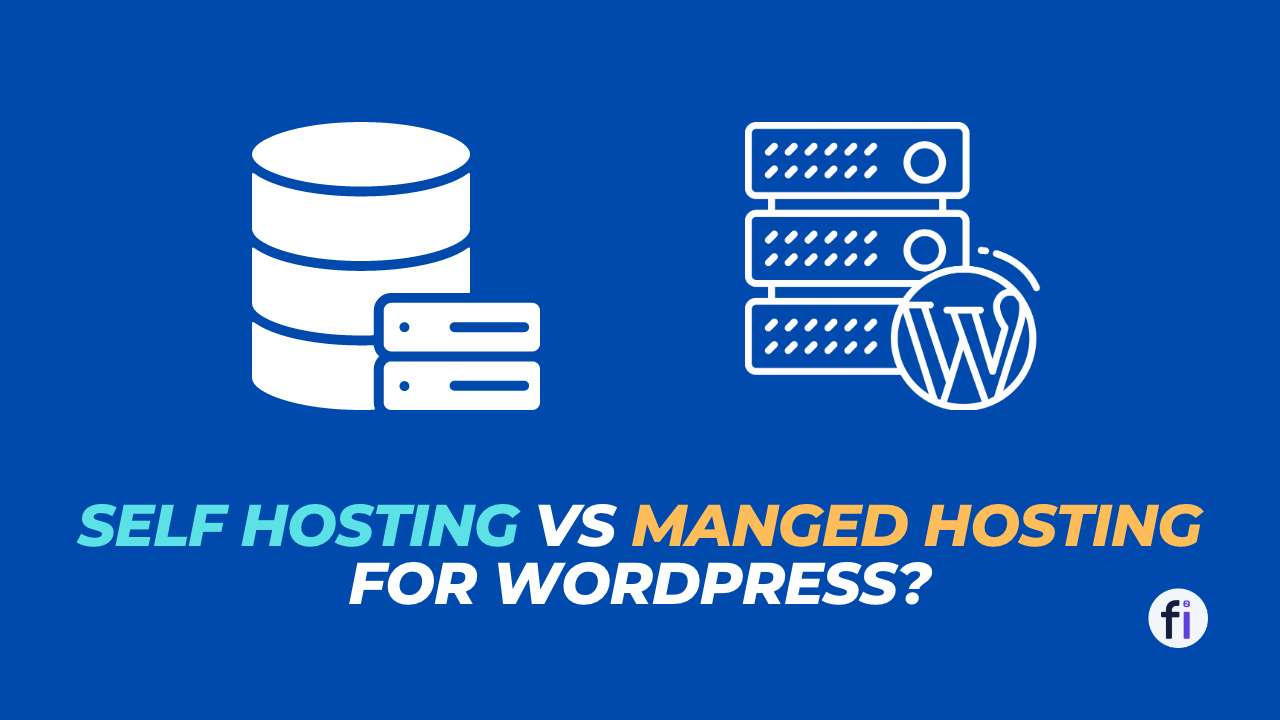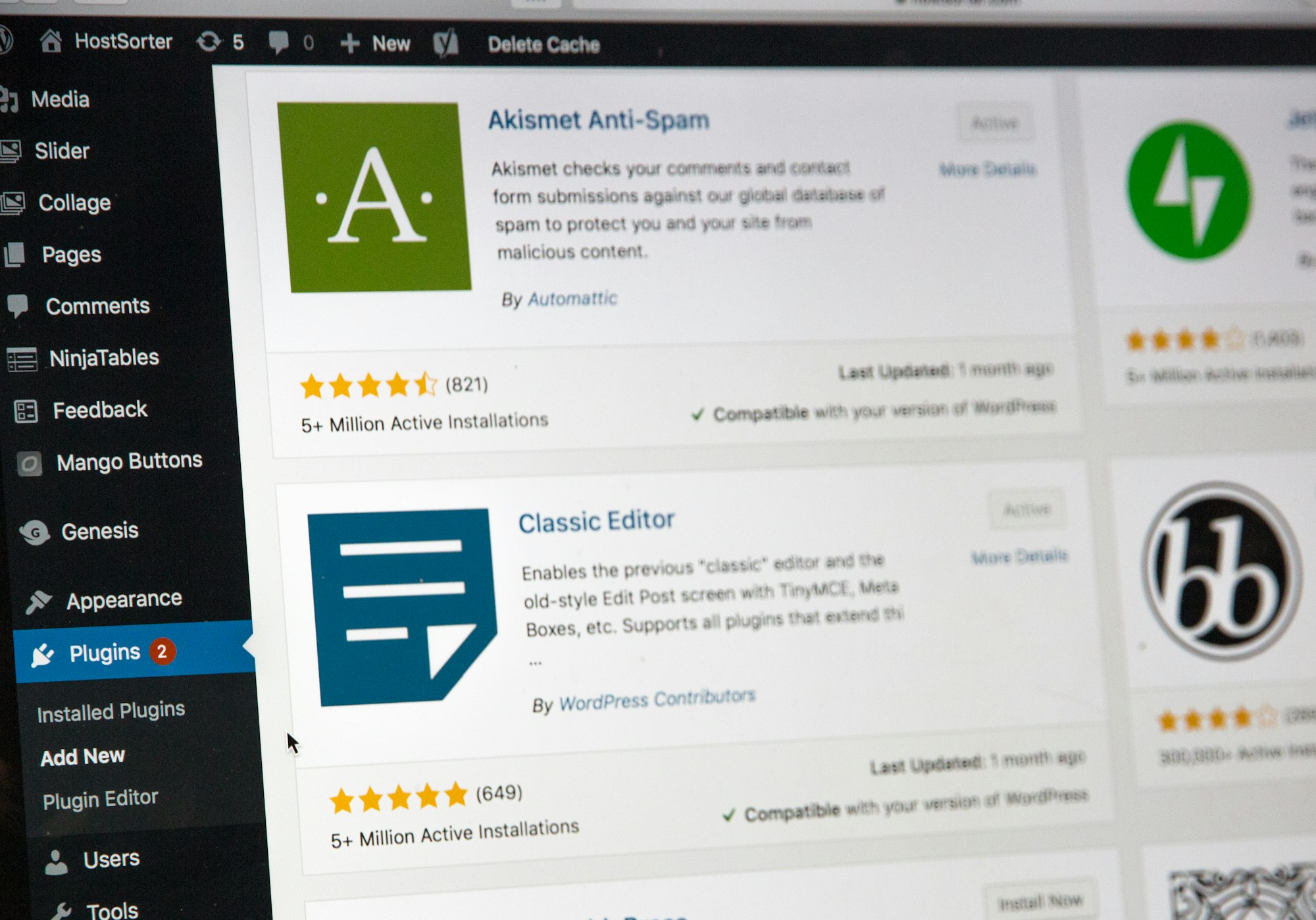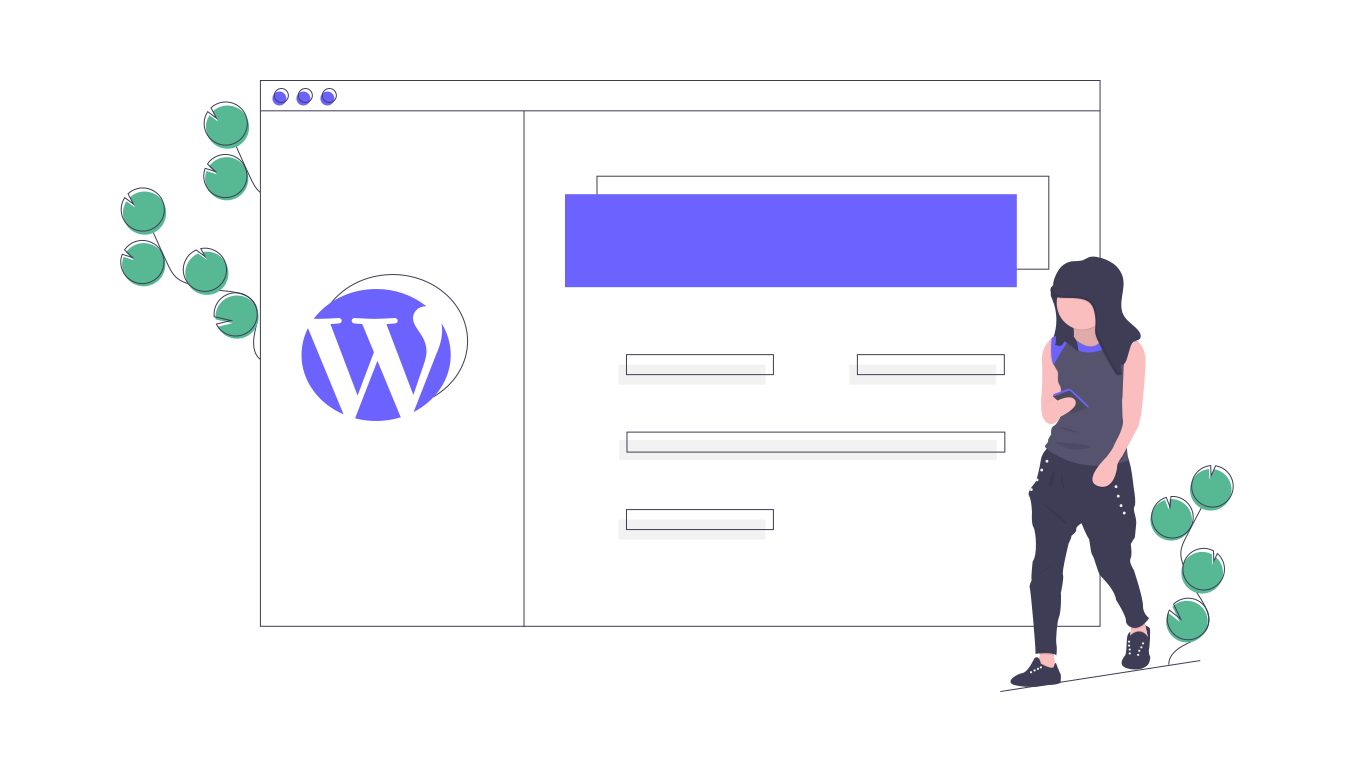Self Hosting vs Managed Hosting For WordPress?
Know, Why you should choose managed hosting over self-hosting for your WordPress website.

When it comes to hosting your WordPress website, you have two options: self-hosting and managed hosting. Self-hosting refers to hosting your website on your own server, while managed hosting means you are using a hosting service that manages your website for you.
Both options have their advantages and disadvantages, but in this article, we will discuss why you should choose managed hosting over self-hosting for your WordPress website.
Why WordPress?

WordPress is a popular and widely-used content management system (CMS) that can be a great choice for many types of websites, including blogs, business websites, e-commerce stores, and more.
Here are some reasons why you might consider using WordPress:
- Easy to use: WordPress is a user-friendly platform with an intuitive interface that makes it easy to create and manage your website.
- Customizable: With thousands of free and premium themes and plugins available, you can customize your website to your exact specifications.
- SEO-friendly: WordPress is designed to be search engine friendly, which can help improve your website's visibility in search results.
- Community support: As an open-source platform, WordPress has a large community of users and developers who can provide support, resources, and guidance.
- Scalable: WordPress can scale your website as it grows, making it a good choice for both small and large websites.

What is Self Hosting for WordPress?
Self-hosting is the process of hosting your WordPress website on your own server or a server you rent from a hosting provider. It involves purchasing your own hardware, installing and configuring the necessary software, and managing your own server infrastructure. Self-hosting requires technical knowledge, as you will need to be familiar with server management, security, updates, and backups. Self-hosting is usually the most affordable option for hosting a website, but it comes with significant responsibilities.
Benefits of Self-Hosting
There are a few benefits of self-hosting your WordPress site, including:
- Cost: Self-hosting is generally cheaper than managed hosting, especially if you have the technical expertise to manage the server yourself.
- Control: With self-hosting, you have complete control over your website and can customize it however you want.
- Flexibility: Self-hosting allows you to choose the server resources and software that you want to use, which can give you more flexibility than managed hosting.
- Learning Opportunity: Self-hosting can be a great learning opportunity for those interested in web development or server management.
What is Managed Hosting for WordPress?
Managed hosting is a service offered by hosting providers that take care of all the technical aspects of hosting your WordPress website. It involves renting a server from a provider that manages the infrastructure, security, updates, and backups for you. Managed hosting providers offer user-friendly interfaces and intuitive control panels that make it easy for you to manage your website without any technical knowledge. They also provide 24/7 technical support to help you with any issues or questions you may have.
Benefits of Managed Hosting
There are several benefits of choosing managed hosting over self-hosting, including:
- Better Performance: Managed hosting providers have servers that are optimized for hosting WordPress websites. This means that they are designed to deliver better performance than a self-hosted website.
- Improved Security: Managed hosting providers take security seriously and implement various security measures to protect their clients' websites. This includes regular software updates, malware scanning, and firewall protection.
- Scalability: As your website grows, you may need more resources to handle the increased traffic. Managed hosting providers can easily scale up your website's resources as needed to ensure it can handle the traffic without any issues.
- Regular Backups: Managed hosting providers also take regular backups of your website to ensure that you can quickly restore your website in case of any issues.
- Technical Support: Managed hosting providers offer 24/7 technical support to their clients. This means that you can quickly get help if you face any technical issues with your website.

Managed Hosting vs Self-Hosting
Which is better for WordPress?
| Features | Self-Hosting | Managed Hosting |
|---|---|---|
| 1. Technical knowledge | Requires a good understanding of server management, security, and performance optimization | Minimal technical knowledge required |
| 2. Setup and maintenance | User has to set up, install, and maintain the server environment and WordPress application | Provider takes care of server setup, security, performance optimization, and WordPress updates |
| 3. Server resources | User has full control over server resources and can scale them up or down as required | Provider offers predefined server resources that may not be suitable for all use cases |
| 4. Server and website security | User is responsible for server and website security and must apply security patches and updates | Provider takes care of server and website security and applies updates as necessary |
| 5. Performance optimization | User is responsible for optimizing server and website performance, including caching, CDN, and database management | Provider optimizes server and website performance by default, including caching, CDN, and database management |
| 6. Cost | Costs are dependent on the hardware and software the user chooses to use, along with any external services they might need | Costs are usually higher, but include server and website setup, maintenance, and security |
| 7. Support | Limited support is available, and users must rely on forums and documentation for help | Provider offers support for server and website issues, usually via email, chat, or phone |
| 8. Customization | Users have full control over server and website customization, including plugins, themes, and code changes | Customization is limited to pre-approved themes and plugins, with code-level changes not allowed |
| 9. Backup and recovery | User is responsible for setting up and maintaining backups and recovery options | Provider takes care of regular backups and offers recovery options in case of a server or website crash |
| 10. Uptime and reliability | Uptime and reliability are dependent on the quality of the hardware and software the user chooses to use, along with any external services they might need | Providers offer high uptime and reliability guarantees, and take care of hardware and software upgrades as needed |
After comparing the benefits of managed hosting and self-hosting, the question remains: which is better for hosting a WordPress website? The answer ultimately depends on your specific needs and priorities.
1. Technical Knowledge:
Self-hosting requires technical knowledge and expertise, as you will need to manage your own server infrastructure. You will need to install and configure the necessary software, set up security protocols, and ensure that your server is always up to date. If you are not familiar with server management, self-hosting can be a daunting task.
Managed hosting, on the other hand, is designed for those who do not have technical knowledge. Managed hosting providers take care of all the technical aspects of hosting your website, so you can focus on creating and managing your content.
2. Security:
One of the biggest advantages of managed hosting is the increased level of security it provides. With self-hosting, you are responsible for your website's security, which means you need to install and maintain security plugins, configure firewalls, and perform regular backups to protect your website from cyber threats.
On the other hand, managed hosting services provide advanced security features such as malware scanning, DDoS protection, and automatic updates, which ensure that your website is always protected from online threats.
3. Reliability:
Managed hosting services also offer higher reliability compared to self-hosting. When you self-host your website, you are responsible for server uptime, maintenance, and technical support. This can be time-consuming and frustrating, especially if you are not a tech-savvy person.
Managed hosting services, on the other hand, provide 24/7 technical support and ensure that your website is always up and running. They also offer a 99.9% uptime guarantee, which means your website will be accessible to your visitors all the time.
4. Speed and Performance:
Website speed is crucial for user experience and SEO. Managed hosting services offer faster loading times than self-hosting because they use the latest server technologies, content delivery networks, and caching techniques. This means your website will load faster, which is essential for improving your search engine rankings and retaining visitors.
5. Scalability:
As your website grows, you may need to upgrade your server resources to handle the increased traffic. With self-hosting, this can be a challenging task because you need to manage server resources and configurations yourself.
Managed hosting services, however, offer scalable solutions that allow you to increase your server resources with just a few clicks. This means you can easily handle traffic spikes without worrying about server performance.
6. Automatic Backups:
Another advantage of managed hosting is automatic backups. With self-hosting, you need to perform regular backups manually to ensure that your website's data is safe.
Managed hosting services, on the other hand, offer automatic backups, which means your website's data is backed up regularly and securely. This ensures that you can quickly restore your website to its previous state in case of any data loss.

Conclusion
If you prioritize performance, security, scalability, and technical support, then managed hosting is likely the better option for you. With managed hosting, you don't have to worry about the technical details of running a website, and you can focus on creating content and growing your website.
On the other hand, if you have technical expertise, a limited budget, and want complete control over your website, then self-hosting may be the better option for you. Self-hosting can also be a great learning opportunity for those interested in web development or server management.
Where You Can Self-Host WordPress in Cloud?
There are several cloud providers that allow you to self-host your WordPress site. Some of the most popular options include:
- Amazon Web Services (AWS): AWS is a cloud platform that offers a variety of services, including EC2 (Elastic Compute Cloud) instances that can be used to host a WordPress site. AWS provides a flexible, scalable, and reliable infrastructure for hosting your site.
- Google Cloud Platform (GCP): GCP is a cloud-based computing platform that allows you to create and host your WordPress site on virtual machines. GCP offers features like high-performance computing, scalable storage, and machine learning.
- Microsoft Azure: Microsoft Azure provides virtual machines that can be used to host your WordPress site. It offers features like auto-scaling and load balancing, making it easy to handle sudden spikes in traffic.
- DigitalOcean: DigitalOcean is a cloud-based hosting platform that offers virtual private servers (VPS) to host your WordPress site. It is known for its simple and user-friendly interface, as well as its competitive pricing.
- Vultr: Vultr is another cloud-based hosting platform that provides virtual private servers (VPS) to host your WordPress site. It offers features like fast SSD storage, multiple server locations, and hourly billing.
When choosing a cloud provider for self-hosting your WordPress site, it's important to consider factors like pricing, reliability, scalability, and security. Be sure to do your research and compare different options before making a decision.
Some Managed Hosting Service Providers for WordPress
There are many hosting providers that offer managed hosting for WordPress, each with their own set of features and benefits. Here are a few options you can consider:
- WP Engine - WP Engine is a popular managed WordPress hosting provider that is known for its fast and reliable hosting, as well as its exceptional customer support.
- Kinsta - Kinsta is a premium managed WordPress hosting provider that offers high-performance hosting with top-notch security and expert support.
- SiteGround - SiteGround is a well-known hosting provider that offers a range of hosting services, including managed WordPress hosting. SiteGround offers fast and reliable hosting with advanced security features and expert support.
- Bluehost - Bluehost is a popular hosting provider that offers a range of hosting services, including managed WordPress hosting. Bluehost offers fast and reliable hosting with easy WordPress installation and expert support.
- Hostinger - Hostinger is a web hosting provider that offers managed WordPress hosting at a low cost. They have different plans and features designed specifically for beginners, such as automatic updates, and a custom control panel for managing your WordPress site.
These are just a few of the many hosting providers that offer managed hosting for WordPress. When choosing a provider, be sure to consider factors such as price, performance, security, support, and features to find the best option for your needs.

FAQs
What is the difference between managed hosting and self-hosting?
Managed hosting refers to a hosting service where the hosting provider takes care of all the technical aspects of hosting a website, while self-hosting refers to a hosting service where the website owner is responsible for all the technical aspects of hosting the website.
How much does managed hosting cost?
Managed hosting prices vary depending on the hosting provider, server resources, and additional features. On average, managed hosting for a small WordPress website can cost between $10 to $50 per month.
Managed hosting is generally more expensive than self-hosting, but it offers several benefits such as better performance, security, scalability, and technical support.
Can I switch from self-hosting to managed hosting?
Yes, you can switch from self-hosting to managed hosting. However, the migration process can be complicated and time-consuming. Most managed hosting providers offer migration services to help you transfer your website to their servers.
What happens if my website experiences a sudden surge in traffic?
Managed hosting services offer scalable solutions that allow you to handle traffic spikes without affecting server performance. They use advanced technologies such as load balancers and content delivery networks to ensure that your website remains fast and responsive.
Can I install custom plugins and themes on managed hosting?
Yes, you can install custom plugins and themes on managed hosting. However, it is essential to choose a managed hosting provider that supports the plugins and themes you need.
Do I need technical knowledge to use managed hosting?
No, you do not need any technical knowledge to use WordPress on managed hosting.

